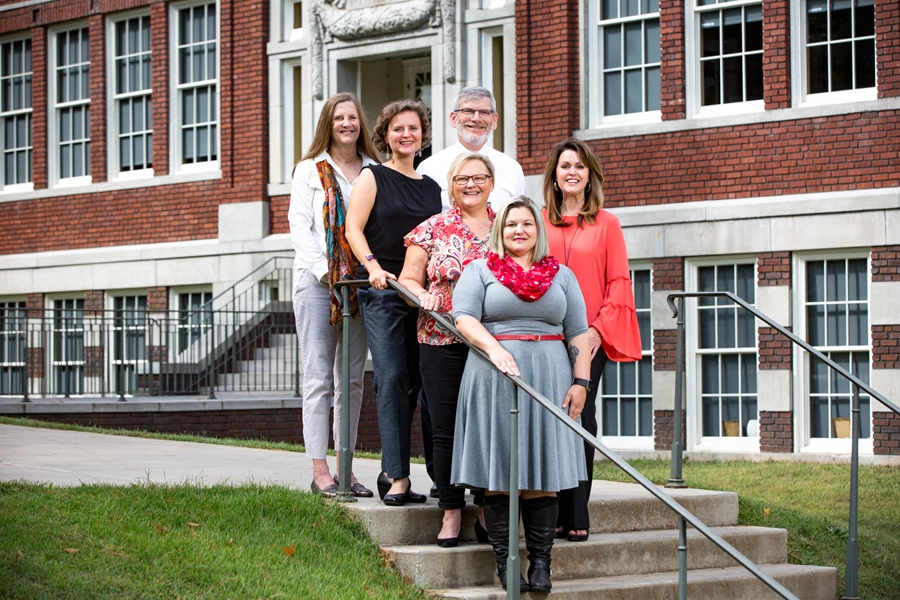
FAYETTEVILLE, Ark. – A new $1 million grant to University of Arkansas faculty from the U.S. Department of Education will be used to prepare 36 U of A graduate students in special education and communication disorders to improve transition services for high school students with disabilities, helping them move into the workforce or post-secondary education.
The College of Education and Health Professions and J. William Fulbright College of Arts and Sciences put together an interdisciplinary team to write the grant proposal. The team will continue to collaborate with school districts and communities throughout the five-year life of the grant. Suzanne Kucharczyk, an assistant professor of special education, is the primary investigator of the grant project along with Peggy Schaefer Whitby, associate professor of special education, and Kimberly Frazier, associate professor of communication disorders. Other members of the team are Ed Bengtson, associate professor of educational leadership; Lynn Koch, professor of counselor education; Kristi Perryman, assistant professor of counselor education; and Johanna Thomas, assistant professor of social work.
“This award is in recognition of the significant need to prepare professionals in these disciplines to work together as they transition students with disabilities through high school to adult life,” Kucharczyk said. “It is also recognition of the incredible team of school leaders, community providers, university scholars, state and national leaders we have assembled who are ready to support this important work.”
The first year of the grant will be devoted to planning and developing graduate courses that focus on an interdisciplinary approach to serving youth with disabilities. The project team will create an interdisciplinary graduate certificate program with a specialization in transition for people with high-need disabilities. The graduate certificate will be for graduate students and professionals working in six areas: special education, speech-language pathology, educational leadership, school counseling, social work and vocational rehabilitation. The project also includes a research component to study the effectiveness of the preparation of practitioners.
Beginning with the fall 2018 semester, the grant will provide tuition and book stipend funding for graduate students in special education and communication disorders. Students will also receive funding to attend a summit sponsored every other year by Arkansas Transition Services, and, in the alternate years, the U of A will offer a transition-focused symposium for individuals with disabilities, families, U of A students, educators, and community organizations. Upon graduation, students who receive funding through the grant will be expected to work in Arkansas schools and will be linked with an Arkansas Department of Education transition consultant.
“Teachers may not always think of pulling other people into the process of working with a student with a disability,” Whitby said. “Our project will increase awareness of the need for an interdisciplinary team, and we will emphasize collaboration in our graduate courses.”
An advisory team has been assembled to guide and evaluate the work of the U of A interdisciplinary team, and it includes a self-advocate, a family with experience in transition, and local, state, and national organizations with expertise in transition. In addition to Arkansas Transition Services, other partners include the Arkansas Department of Education, Arkansas Support Network, the National Technical Assistance Center on Transition and several school districts in Northwest Arkansas. The grant team will organize demonstration projects at several high schools in which they will offer intensive, collaborative support and services.
“Through education, we also hope to push the community to be more creative on establishing places for young adults to work and learn after high school,” Whitby said.
The U.S. Department of Education ranked the U of A proposal first among the 112 applications, 30 of which the agency funded. Only two other proposals focused on transition services.
The award comes as the Arkansas PROMISE project, funded in 2013 with a $35.7 million federal grant to the College of Education and Health Professions and the Arkansas Department of Education, begins to wrap up. The PROMISE project provides two paid summer work experiences for youth with disabilities. The researchers are now collecting data to assess the project’s impact on the success of youth after high school in both the workforce and post-secondary education.
“The state of Arkansas is well-poised to make a significant impact on the transition of students and families due to the efforts of the Arkansas PROMISE model demonstration project and the intensive support provided to the Arkansas Department of Education by the National Technical Assistance Center on Transition,” according to the proposal abstract. “Without an interdisciplinary pre-service program focused on transition, these efforts are not likely to be sustained once the PROMISE grant and intensive assistance from the NTACT cease.”
Current and potential students interested in more information on the project should contact Kucharczyk at suzannek@uark.edu.
Topics
Contacts
Suzanne Kurcharczyk, Assistant Professor of Special Education
College of Education and Health Professions
479-575-6210, suzannek@uark.edu
Heidi Wells, content writer and strategist
Global Campus
479-879-8760,
heidiw@uark.edu